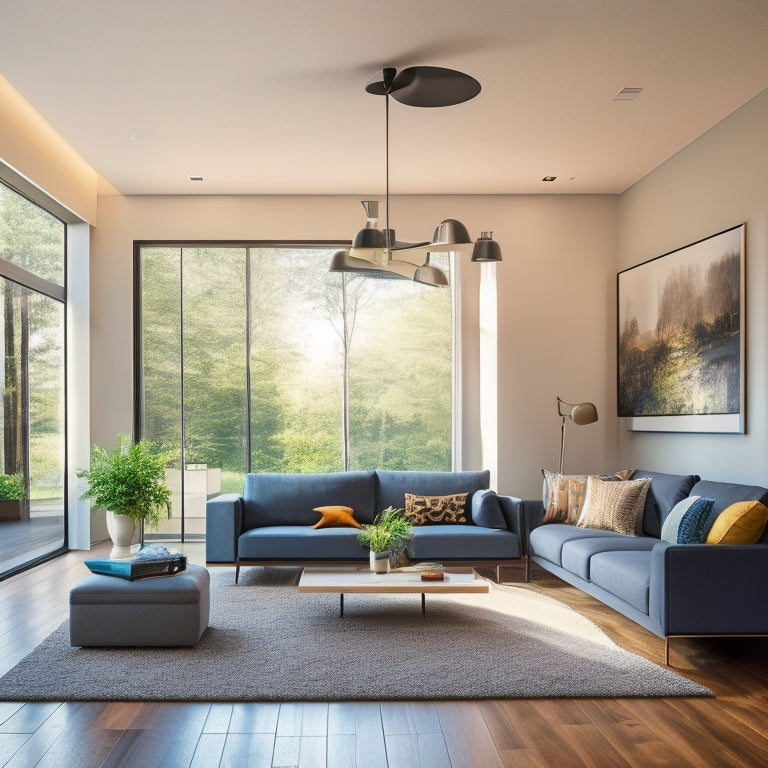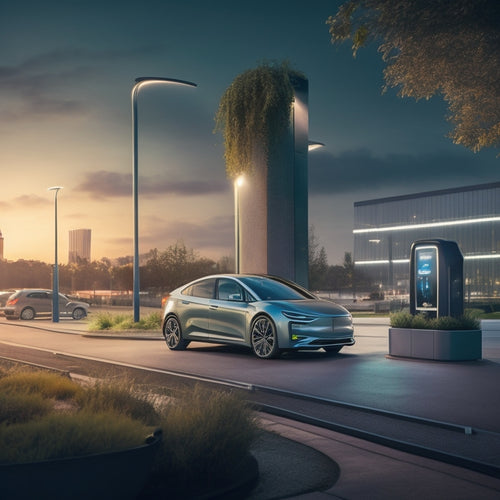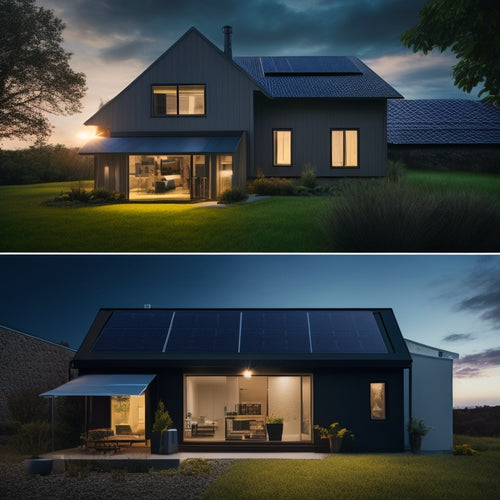
5 Best Home Lighting Systems for Energy Independence
Share
You're looking for home lighting systems that'll help you achieve energy independence, and with the cost of traditional energy sources rising, it's no wonder. Affordable solar lighting solutions, energy-efficient LED options, off-grid systems, solar-powered systems, and self-sustaining systems are all viable options. Each offers unique benefits, such as reduced energy consumption, minimized maintenance, and optimized energy usage. You'll find that some systems integrate seamlessly with smart home devices, allowing remote control and scheduling. By exploring these options, you'll be well on your way to reducing your energy bills and reliance on traditional providers - and that's just the beginning of your expedition to energy independence.
Key Takeaways
- Solar powered lighting systems with energy storage provide reliable lighting during extended periods of low sunlight, ensuring energy independence.
- Off-grid home lighting systems with solar battery storage and energy-efficient LED fixtures minimize reliance on traditional energy providers.
- Self-sustaining home lighting systems utilizing high energy conversion rate solar panels and advanced smart home systems optimize energy collection and usage.
- Energy-efficient lighting options like LED technology and smart thermostats reduce energy consumption, making it easier to achieve energy independence.
- Affordable solar lighting solutions with cost-effective installations and decreasing solar technology costs make energy independence more feasible for homeowners.
Affordable Solar Lighting Solutions
Switching to solar lighting solutions can bring you one step closer to energy independence, and the good news is that it's becoming increasingly affordable.
Solar lanterns benefits include reduced energy costs, minimal maintenance, and a lower carbon footprint. By utilizing Energy-Collecting Systems solar energy storage, you can store excess energy generated during the day for nighttime use.
Cost-effective installations can be achieved through the use of energy-efficient solar panels and batteries. By capturing natural sunlight, you can power your lighting systems, reducing your reliance on traditional energy sources.
With the decreasing cost of solar technology, it's now more feasible to integrate solar lighting into your home. By making the switch, you'll not only reduce your energy bills but also contribute to a more sustainable future.
Energy-Efficient Lighting Options
Across various aspects of your home, you're likely to find opportunities to upgrade to energy-efficient lighting options. LED technology, in particular, has revolutionized the industry with its extraordinary energy-saving capabilities. By switching to LED bulbs, you can expect significant reductions in energy consumption, often by up to 90%.
Additionally, LED lights have a longer lifespan, lasting up to 25 times longer than traditional incandescent bulbs. Furthermore, integrating Energy Efficient Smart Thermostats can further optimize energy usage and enhance overall energy efficiency.
Smart lighting systems take energy efficiency to the next level, allowing you to control and schedule lighting remotely, optimize usage, and even integrate with other smart home devices.
Off-Grid Home Lighting Systems
In your pursuit of energy independence, off-grid home lighting systems emerge as a viable solution, allowing you to employ renewable energy sources and sever ties with the grid.
These systems are designed to provide reliable lighting while reducing your reliance on traditional energy providers. Off-grid home lighting systems often incorporate solar battery storage to guarantee a steady supply of power, even during periods of low solar irradiance.
A well-planned off-grid design takes into account factors such as energy demand, storage capacity, and system maintenance to guarantee peak performance. Additionally, it's vital to reflect on energy efficiency measures to lower overall consumption and DIY solar kits that cater to diverse financial needs.
Energy-efficient lighting options, like LEDs, are often used to minimize energy consumption. Battery backup systems can provide power during outages or periods of low energy production.
Regular system monitoring and maintenance are significant to guarantee the longevity and efficiency of your off-grid home lighting system.
Solar Powered Lighting Systems
As you investigate off-grid home lighting systems, you may find that solar powered lighting systems offer an intriguing solution for energy independence.
These systems utilize the sun's energy through solar panel integration, converting it into electrical energy to power your lights.
With smart lighting technology, you can control and monitor your lighting system remotely, adjusting brightness and schedules to optimize energy efficiency.
Solar powered lighting systems can be designed to provide reliable, consistent lighting even during extended periods of low sunlight.
Self-Sustaining Home Lighting
With your home's unique energy needs in mind, you can design a self-sustaining home lighting system that maximizes efficiency and minimizes reliance on public utilities.
This system integrates solar panel integration, utilizing renewable energy to power your lights. By incorporating smart lighting automation, you can optimize energy usage and reduce waste.
Consider the following key components:
- Energy-efficient LED lighting fixtures that minimize power consumption
- Solar panels with high energy conversion rates for maximum energy collection
- Advanced smart home systems that learn your lighting habits and adjust accordingly
- Energy storage solutions, such as batteries, to guarantee a steady power supply
- Automated lighting schedules that adjust to natural daylight and occupancy patterns
Frequently Asked Questions
How Do I Determine the Right Lighting System for My Home's Size and Layout?
Are you stuck in the dark about choosing the perfect lighting system for your home? You'll want to contemplate a customized lighting design that maximizes energy efficiency, factoring in your home's size, layout, and natural light availability.
Can I Install a Home Lighting System Myself, or Do I Need a Professional?
You can attempt a DIY installation, but consider the safety risks; if you're not familiar with electrical work, it's recommended to hire a professional to guarantee a safe and efficient home lighting system installation.
What Is the Average Lifespan of a Solar-Powered Lighting System?
You're wondering about the average lifespan of a solar-powered lighting system; typically, it's 15-20 years, depending on solar panel efficiency and battery longevity, with proper maintenance, ensuring your system remains efficient and effective over time.
Are Energy-Independent Lighting Systems Compatible With Smart Home Technology?
You steer through the world of smart home technology like a seasoned sailor charting unfamiliar waters, wondering if energy-independent lighting systems can anchor themselves to your existing setup; rest assured, many systems seamlessly integrate with smart lighting controls and energy-efficient bulbs for a harmonious coexistence.
Can I Use a Home Lighting System in Conjunction With Traditional Grid Power?
You can integrate a home lighting system with traditional grid power, achieving grid integration while maintaining energy efficiency, and allowing you to switch seamlessly between energy sources, depending on your needs and preferences.
Related Posts
-

Solid State Batteries in Electric Vehicles
Solid-state batteries revolutionize electric vehicles by offering a longer lifespan and higher energy density than tr...
-
Average Lifespan of Solar Battery Banks
The average lifespan of solar battery banks generally ranges from 5 to 15 years. This variation mainly stems from the...
-

Cost of Home Solar Battery
You're looking to invest in a home solar battery to reduce your grid reliance, but you're curious about the cost. The...

